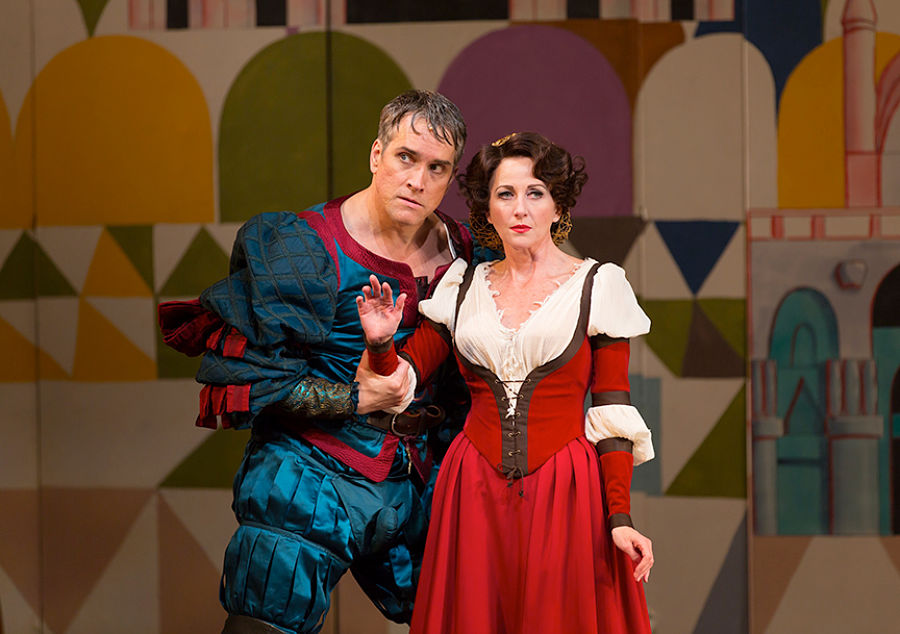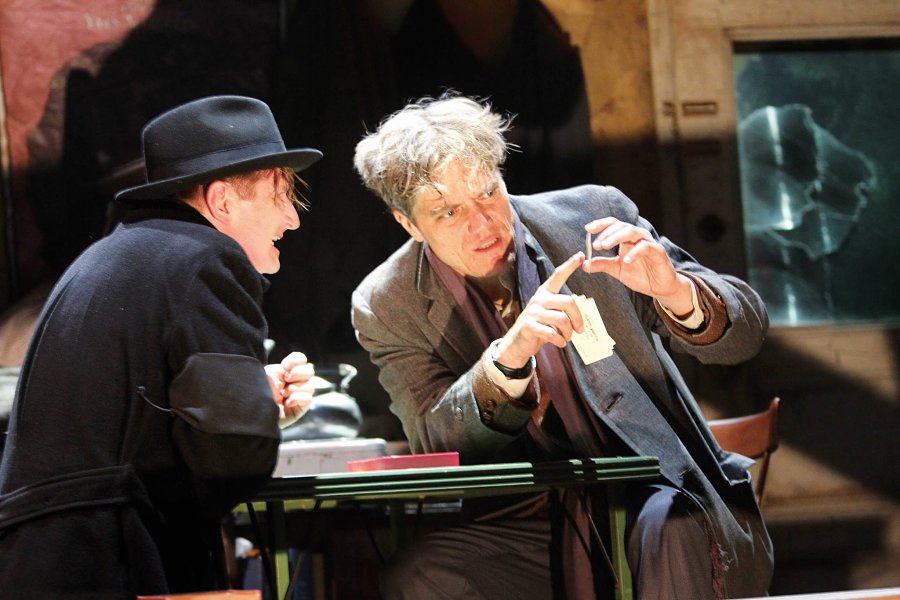“Lately I seem to get awards for shows about serial killers,” quipped Darko Tresnjak in a recent interview. The director of the Tony-winning (and still running) A Gentleman’s Guide to Love and Murder had recently received an Obie for directing Michael Shannon and an illustrious cast in Ionesco’s absurdist epic The Killer for Brooklyn’s Theatre for a New Audience last spring.
He’s now in the midst of a slightly frothier assignment: a revival of the musical Kiss Me, Kate, in a coproduction between Hartford Stage, the Connecticut theatre for which he serves as artistic director (whence Gentleman’s Guide also sprang), and San Diego’s Old Globe, where it’s now running through Aug. 2. Tresnjak, a native of Yugoslavia who built his reputation directing lesser-known classics, will barely take a break before diving into another busy Hartford Stage season, in which he’ll direct three productions, including a stage musical version of the animated film Anastasia with a book by Terrence McNally and a score by Stephen Flaherty and Lynn Ahrens, which opens next spring, and a new stage adaptation of the thriller Rear Window, which runs Oct. 22–Nov. 15.
He spoke recently from the midst of Kiss Me, Kate tech in Hartford.
Rear Window sounds like an amazing, and daunting, idea for the stage. How are you going to do it?
Keith Reddin wrote a taut, gritty adaptation, true to the spirit of the original Cornell Woolrich story. The play takes place inside of a sweltering, claustrophobic apartment, very much like the addled brain of the leading character. The stage space is a mental space. But what actually happens in the apartment is completely different from the film. There is no Grace Kelly. There is a young black man called Sam, and the adaptation has something to do with recent events, interestingly. The thriller aspect is similar, but the psychology of the main character, Jeffrey, is completely different. Keith knows a lot about Cornell Woolrich and his actual biography, and he draws on that knowledge in his adaptation.
Are you attracted to thrillers as a form?
The second big production I did when I was at Swarthmore College was The Visit, and at one point people screamed. I’m interested in fear onstage, as opposed to in the cinema. I’ve done several productions of Titus, and I hope to do more; I’m never done with that play.
But you’re not picking projects based on, “I’d like to do a thriller next.”
No. I would never have done a musical if the right one hadn’t come along, and I wouldn’t be doing a stage thriller if Keith’s script hadn’t come along.
Tell me about your take on Kiss Me, Kate. Does its view of the war of the sexes, for instance, need any tweaking for modern sensibilities?
Tweaking, perhaps; apologizing, no. I always assume that my audience is smart, and that they understand that this piece was written in 1948. I think it’s rather refreshing how explicit the men and the women in Kiss Me, Kate are about their sexual needs and desires. Beyond that, it’s a chance for me to collaborate with Peggy Hickey, who choreographed A Gentleman’s Guide, on a great dance musical.

With Gentleman’s Guide, Kiss Me, Kate, and this coming season Anastasia, you’re becoming a go-to director for musicals.
It’s funny, because they used to call me the Shakespeare guy. Before that I was the “give it to Darko, he’ll direct it” guy. I’ve directed two productions of The Two Noble Kinsmen, of Moliere’s Amphitryon. I did a lot of revivals of very obscure, non-canonical plays of great writers.
How have things changed for you, and for Hartford Stage, since you won all those Tonys?
Honestly, it has been a wonderful and busy year since then. Some wonderful new works, like Anastasia and Rear Window, have come my way. And I’m developing a few things from scratch—ideas that have been floating around in my brain for years. As for Hartford Stage, the awards certainly seemed to have had a positive effect on our box office. Subscriptions and single ticket sales are both up this season. It’s still a fairly new story. Soon that will level off, and we’ll need a new one.
Have expectations of Hartford productions also gone up?
“Is it going to move to New York?” I can only answer that question so many times. I do everything for my Hartford Stage audience. I don’t give a rat’s ass if it doesn’t go anywhere else. It’s not healthy to think that way. I understand the pressure and the desire, if you spend years working on something, that you want it to have a future life. But you have to do it for the audience you have.
Before you directed on Broadway, your New York home has mostly been Theatre for a New Audience, right?
Yes, Jeffrey Horowitz’s theatre. I don’t know any artistic producer who takes so much time to get to know an artist—to really get to know what makes an artist tick. He burrows through your mind. He even told me how Gentleman’s Guide relates to my other work: The first show I did for Theatre for a New Audience was All’s Well That Ends Well, and he said it’s a little bit like Gentleman’s Guide—it’s about an outsider burrowing their way in. And it’s far more satirical play than people give credit for.

The Killer was not a show that was on my list. Jeffrey called and asked me; he said it was Michael Shannon’s favorite play, that he thinks of it the way some people think about Hamlet. I thought of it as a mystery play, in both senses of the term. The character Michael played is probably the most hapless detective ever put onstage. Along the way, he meets characters that seem almost allegorical. I decided that Robert Stanton’s character, the architect, was Satan. Edward, played by Paul Sparks, was clearly Death personified.
How would you compare the process of new work versus revivals—of collaborating with living versus dead authors?
Nothing takes more time, and nothing is more strenuous, than birthing a new musical. Under any circumstances they take years to write. They’re expensive, and everyone’s jockeying for time: authors, music directors, choreographers. Even when you’re doing a musical revival, it’s more complicated than directing an opera or directing a play. But on the other hand, by and large, it’s a populist art form designed to give pleasure. So those are the contradictions built into that. Directing revivals is my comfort zone, and what I do at Hartford Stage.
Anastasia is yet another big show, and a musical. What does that story have to say to today, with a newly belligerent Russia? Or am I reaching here?
Yes, you are reaching. It’s a princess story—smart family entertainment that grandchildren and grandparents and everyone in between can hopefully enjoy together. There isn’t much of that kind of work. It’s a wonderful opportunity for me to work with Terrence and Lynn and Stephen; few things in theatre are as gratifying as witnessing an overnight creation of a beautiful song. That’s what I love the most about working on a new musical.
Do you ever want to just direct a two-character chamber piece?
No.
How do you juggle running a theatre and having a freelance directing career?
I’ve given up on sleep, nutrition, and exercise.
What are you reading for fun, if anything?
For fun? Honestly, trolling Facebook. Jane Austen would have loved Facebook: There’s genuine heartbreak and sidesplitting humor and too much sharing, and oodles of self-righteousness and grandstanding.
What’s your favorite guilty pleasure?
Since we’ve moved to Connecticut, scotch. The winters are so long.

You have a dog, I seem to recall.
Yes, Josh and I have Hector, a French bulldog. He’s my guiltiest pleasure. When you work in the theatre, you have to have something that the theatre won’t take over. And there’s nothing healthier than having to take care of the needs of a puppy. Otherwise theatre will take your life over, and I’ve let that happen many times.
Honestly, I’m really a homebody. I love staying home with my husband and my dog and cooking. That’s where I get ideas and strength; I need those nights at home.
There will be many nights away in the coming year.
Yes, Kiss Me, Kate is going to San Diego, and the national tour of Gentleman’s Guide is kicking off. Then I’ve got Rear Window, and then a little break, and then Romeo and Juliet, and then Antastasia.
Romeo and Juliet? I forgot about that one.
Yeah—it’s taken me 24 Shakespeare productions to get to Romeo and Juliet. I think it’s more complicated than people think. It’s the Carmen of Shakespeare: Carmen has these famous arias, and Romeo and Juliet has these famous speeches—and then there’s the rest of the play, which is actually a rather young play, and has problems.
Titus is a young play, too.
Yes, but with Titus, you don’t have the pressure of people thinking it’s a great play. With Romeo and Juliet you have to deal with the expectation of greatness. There’s greatness in that play, but you have to do some work on it.
Much Ado, similarly, has great passages, and some problem parts.
Many people love Much Ado and Taming of the Shrew, and I used to think I’d do them all, but I don’t anymore. I like Kiss Me, Kate; that’s as close as I’m going to get to Taming of the Shrew.
It’s not theatre unless…
…everyone and their mother and their aunt and their second cousin can tell you how to do it.


